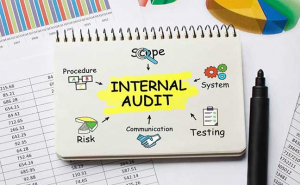Free knowledge to monitor the world of events. Have a look at our must read Blogs on Pharma, Finance, HR, Health and Cross Industry.
Internal Auditing : A Brief Overview
2021-10-19
Internal Auditing in the sense independent assurance and consulting activity performed to add great value and improve an organization’s operations.
It assist an organization to assess and improve the performance of risk management, control and governance processes. Furthermore, internal auditing should produce services that are selected to improve value creating activities.

Check Now : The Future of Internal Audit MasterClass
What do Internal Auditors do?
The main role of internal auditors that to make sure the organization is in conformity with laws and regulations. And also to assure that the departments and employees follow proper plan. Internal auditors are independent from the operation and classify and report to higher level in the organization such as Board of Directors, Accounting Officers or the Audit Committee. To be more powerful, Internal Auditors must be well qualified, skilled and experienced, who can work in order to the Code of Ethics and International Standard.
Another main role of this job is Asset protection through Risk Management. These Risks will be differs from fraud and legal exposure to internal policy and mismanagement. Internal Auditors produce risk assessments for each departments. They create checklists and supervise audit duty schedules. It’s also a duty of Internal Auditor to regularly check internal accounting procedures and operating systems.

Internal Vs. External Auditors
There is a confusion about the difference between Internal Audit and External Audit. It’s important to understand what the difference between them are…
Internal Auditors are typically employees of the company. Their duty is within the organization and they need to report to their Audit committee or Directors. They assist to develop organization’s system and help to develop specific risk management policies and Process Improvement. Also they evaluate and improve the effectiveness of governance. They have to report at any frequency designated by the board.
External Auditors are independent and typically the member of CPA firms. They report to shareholders and members outside the company. They deliver their experienced opinion on the organization’s financial statements and reporting. They have to report annually.

Why Internal Audit important to an organization?
Every organizations have their own risks therefor the Important Risks must be Evaluated and Highlighted where the enhancements are necessary by the Internal Auditor. It will assist higher management to determine that they are managing their organization productively.
Types of Internal Audit
Nowadays many organizations have identified the need for the types of audits outside of accounting or finance. Below are a brief introduction of Internal Audit types:
Compliance Audit – assess compliance with applicable laws, regulations, policies and procedures.
Environmental Audit – evaluate the impact of the organization’s operations on the environment.
IT Audits – assess information systems and the underlying infrastructure to assure the efficiency of their processing, security and customer confidential information.
Operational Audits – evaluate the organization’s control mechanism for their overall efficiency and reliability.
Performance Audit – assess whether the organization is meeting the metrics set by the management in order to achieve the goals.
Estimating the Management of Risk
The field of internal audit is estimating an organization’s management of risks. Every organizations deal with risks such as Health and safety risks, Supplier failure, Market Failure, Cyber security and Financial risks. A healthy organization’s success depends in the effective management of those risks. To estimate how well risk are being managed, the internal auditor will evaluate the quality of risk management process.
Do you want to seize more about Auditing? Join us at the The Future of Internal Audit Online MasterClass on 10th to 11th February, 2022.
Also check our In-house Training for your employees and team development.
By Fazmi Zakam, Junior SEO Executive, GLC Europe, Colombo Office, Sri Lanka.
Get a feel for our events

Training Program for CMC Leaders - EU edition
14th September 2026 - 09th April 2027
Rich with practical insights and real-world applications
learn more >>
Training Program for CMC Leaders - US edition
14th September 2026 - 09th April 2027
Rich with practical insights and real-world applications
learn more >>
Advanced Stability Testing of Pharmaceuticals MasterClass - US edition
24-27 February, 2026
Increase the likelihood of studies receiving regulatory approval
learn more >>












